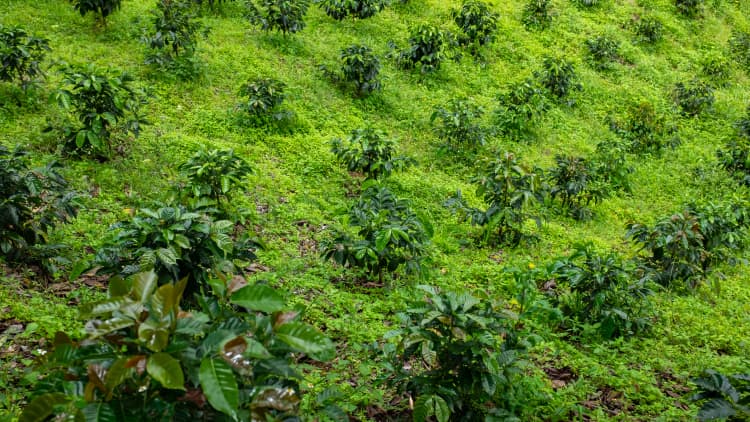The co-CEO of multinational science firm DSM stressed the deep connection between climate change and food systems on Thursday, emphasizing the importance of moving fast and using technology to tackle the challenges they create.
Speaking to CNBC's "Squawk Box Europe", Geraldine Matchett said food systems were "one of the big causes of climate change, with about 25% of … greenhouse gases coming from the agricultural and food space." They were also, she said, "one of the biggest victims."
According to the Food and Agriculture Organization of the United Nations, "food systems" encompass everything from production and processing to distribution, consumption and disposal.
A key cog in this is agriculture, which is prone to being affected by climate change. Indeed, the FAO has described climate change as having "both direct and indirect effects on agricultural productivity including changing rainfall patterns, drought, flooding and the geographical redistribution of pests and diseases."
Given the above, it's no surprise many view the challenge of producing enough food whilst simultaneously adapting to climate change and mitigating the environmental footprint of agriculture as huge.
Later this year, these subjects will be addressed in detail at the COP26 conference on climate change and the UN Food Systems Summit, due to be held in the Scottish city of Glasgow and New York, respectively.
Looking ahead to these events, Matchett described herself as being "very optimistic." She added: "When there's (a) realization that there's urgency, but there's also a lot of innovation that is already here to fix this, we can get moving."
Matchett went on to explain how she thought a renewed focus would be placed on agriculture at COP26.
"I think one of the key actions that is going to be pushed … is for every country to embed in their targets the agricultural space," she said.
There's a "very understandable reason why this was very difficult at first: it's because the food space is not a few big companies or corporations, it's millions of farmers, it's millions of families."
Acknowledging the reach of this area was very broad, Matchett also touched upon how things could change for the better through carbon sequestration and other technologies connected to agriculture and livestock.
The United States Geological Survey describes carbon sequestration as "the process of capturing and storing atmospheric carbon dioxide." Breaking things down a bit further, carbon capture can take place naturally — through forests, for example — or via artificially engineered systems developed by humans.
"There are many things where you can actually turn the farming community into the heroes of helping fix climate change, and at the same time, be better off," she added. "So there's a great opportunity, and that's what's nice in that space: it's packed with opportunity."
Ideas and innovation

Perhaps one example of this is the Cauca Climate-Smart Village project in Colombia, an initiative which has focused on developing farming practices that it's hoped will be both sustainable and resilient to future challenges.
Ana Maria Loboguerrero is head of global policy research at the CGIAR Research Program on Climate Change, Agriculture and Food Security.
In an interview with CNBC last year, Loboguerrero said the project in Cauca was co-generating evidence with farmers on "the practices, the technologies, that can help us to increase productivity and food security, that can help us to increase adaptation to climate change and variability and that can help us to reduce greenhouse gas emissions."
During a panel discussion at the World Economic Forum on Wednesday moderated by CNBC's Steve Sedgwick, the notion of using new tech and innovations in farming was reinforced by the CEO of PepsiCo, Ramon Laguarta.
"The concept of demonstration farms is proving to be very powerful," he said.
"So, building demonstration farms where we have the new techniques and where … neighborhood farmers go and learn from their peers, that's a huge concept (and) we have many demonstration farms across the world."
"(The) second concept that we're working on, with the World Economic Forum and some other colleagues, is innovation hubs," Laguarta said.
"There is a lot of money … a lot of ingenuity, going into fintechs going into … other fields – there's not enough going into agritech," he continued.
"And I think we can play a role — large companies with the public sector as well — to build innovation hubs, to bring technology and innovation closer to the farmer."




